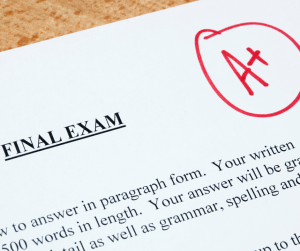The clue is in the name – ‘A’ Level should mean ‘advanced’
 Once again A’ Level results were collected by worried sixth formers and once again they performed better than any year group that had gone before them.
Once again A’ Level results were collected by worried sixth formers and once again they performed better than any year group that had gone before them.
It seems we are trapped in an unending spiral of grade inflation, and if it continues on its current trajectory, it won’t be long before every student is an A-grade student.
The Centre for Education and Employment Research of the University of Buckingham issued a paper in 2014 on this subject.
The paper covered the rates of A’ Level passes since 1951 and the figures were very worrying. It found no significant change between 1951 and 1987; about 10% of students scored an A and the overall pass rate was around 70%.
I remember one of my students at this time who earned a B in one of her A’ Levels and she was congratulated as she was expected to struggle to obtain a C. I was also congratulated as her teacher as it was thought that this was a significant achievement by all.
It wouldn’t be regarded so now. According to the 2014 paper around 20% of students in 2004 scored an A, and by then more than 90% were passing.
By 2014 the numbers achieving an A had increased further to around 26% and the pass rate had risen to about 94%.
While there was a slight drop in the numbers being awarded an A or A* grade in 2019 due to the changes in the balance between coursework and exams, we are now faced in 2021 with a staggering 44% achieving A* or A, and a pass rate of 98%.
How has this happened?
The increase this year can be partly explained by teacher assessments, which have been poorly moderated. How many schools want to fail their students? The answer is none. Teachers would find it is incredibly difficult to be impartial when they are assessing their own students.
The assessments have been inconsistent; some schools have done it well and others with less scrutiny.
Only examinations can really be trusted because every youngster does the same exam on the on the same day at the same time. It may be crude and not favour those who prefer coursework, but it is a much fairer than what has happened this year.
Another reason is a lack of political will. Politicians want to tout success and both major parties are to blame for this disastrous situation.
It started towards the end of the 80s and into the 90s under the Major Government and continued apace though Tony Blair’s term of office.
The trend was firmly established by the early 2000s. Every year the Education Secretary would stand up in the Commons and announce another record year in A’ Level results.
The real truth is that the goalposts were being moved each year and getting an A was becoming easier, and so was passing the examination.
As more young people were going on to study A’ Levels it would not be acceptable for there to be a high failure rate – and more A grades made the government look good.
After all, Tony Blair had said, ‘Education, education, education’ as one of his political maxims. He wanted 50% of young people to go to university and that meant they had to pass and achieve higher grades.
In educational terms it is disastrous and it’s hard to turn back the clock.
The opposition – whoever they are – would always accuse the other side of a failing educational system if grades were to fall.
While the increased number of A grades might provide a feel-good factor for students, they are not honest.
The reality is that only around 25% of students are academically able so the results are not truthful.
The time has now come for a wholesale reform of the entire system.
I propose that we have proper academic qualifications at the end of years 11 and 13 – but also provide technical qualifications at both levels.
A one-size fits all system is not working at either level.
It fails to recognise truly academically able children and it is also deceiving those who are not academically able.
Our system should recognise excellence on the academic side and the technical side, but it cannot do both at the same time.
There has been an attempt to flatten out the system to make it more equal – but people are not equal in academic ability.
Vocational and technical subjects must not be deemed less important than academic subjects. They are a different skillset.
If this were to happen then students would find there was less pressure to take academic A’ Levels, as is often the case.
This would help rebuild a system that was truthful and honest, and one that could be relied on by universities and employers.